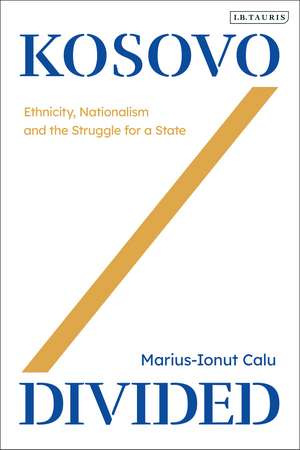Kosovo Divided: Ethnicity, Nationalism and the Struggle for a State
Autor Marius-Ionut Caluen Limba Engleză Paperback – 20 oct 2021
| Toate formatele și edițiile | Preț | Express |
|---|---|---|
| Paperback (1) | 218.26 lei 6-8 săpt. | |
| Bloomsbury Publishing – 20 oct 2021 | 218.26 lei 6-8 săpt. | |
| Hardback (1) | 598.92 lei 6-8 săpt. | |
| Bloomsbury Publishing – apr 2020 | 598.92 lei 6-8 săpt. |
Preț: 218.26 lei
Preț vechi: 275.19 lei
-21% Nou
Puncte Express: 327
Preț estimativ în valută:
41.76€ • 43.60$ • 34.56£
41.76€ • 43.60$ • 34.56£
Carte tipărită la comandă
Livrare economică 04-18 aprilie
Preluare comenzi: 021 569.72.76
Specificații
ISBN-13: 9780755637249
ISBN-10: 0755637240
Pagini: 264
Dimensiuni: 156 x 234 mm
Greutate: 0.38 kg
Editura: Bloomsbury Publishing
Colecția I.B.Tauris
Locul publicării:London, United Kingdom
ISBN-10: 0755637240
Pagini: 264
Dimensiuni: 156 x 234 mm
Greutate: 0.38 kg
Editura: Bloomsbury Publishing
Colecția I.B.Tauris
Locul publicării:London, United Kingdom
Notă biografică
Marius Calu is a lecturer specialising in the fields of Global Politics, Contemporary Security and Research Methods. He has worked at Regent's University London, King's College, UCL and Queen Mary, University of London. He earned his PhD in Political Science in 2015 and he has also completed an MRes in International Relations (Queen Mary, UoL) and a BA in Politics (University of London). He has undertaken research in the fields of International Relations, Comparative Politics and Nationalism Studies with a focus on contemporary norms and practices of post-conflict statebuilding and nationbuilding, the critical analysis of interventions and governance in multiethnic societies. As a research associate for LSE, he worked for the MAXCAP project in Serbia investigating the independence of the judiciary in the context of Europeanisation.
Cuprins
Introduction 1 Statebuilding and Multiethnic Governance 2 Post-conflict and Post-independence Statebuilding in Kosovo 3 The Integration, Accommodation and Protection of Kosovo Serbs 4 Non-dominant Minorities in Kosovo 5 Managing Diversity through Decentralization Conclusion: The Struggle Continues
Recenzii
By exposing the unintended consequences of the internationally engineered management of diversity that both weakened the state and hampered integration of minorities in post-conflict Kosovo, Calu makes a crucial and indispensable argument for examining the fatal gap between state-building templates and state-building practices.
Marius Calu's empirically rich and theoretically robust analysis is a fascinating, and original contribution. By highlighting how the ambitious aspirations of liberal state-building floundered when implemented in Kosovo, Calu demonstrates that externally contrived policies designed to facilitate plurality and multi-ethnic harmony, had a series of unintended negative consequences. The book's findings have great relevance beyond Kosovo and should be read by all those interested in managing divergent identities within the modern state.
This valuable work carefully analyses the gap between the rhetoric and practice of building a multi-ethnic Kosovo. Importantly, it goes beyond the Serbian community and considers other often overlooked groups, such as Roma, Ashkali and Bosniaks. This makes it a particularly welcome contribution to our understanding of contemporary Kosovo.
Marius Calu's empirically rich and theoretically robust analysis is a fascinating, and original contribution. By highlighting how the ambitious aspirations of liberal state-building floundered when implemented in Kosovo, Calu demonstrates that externally contrived policies designed to facilitate plurality and multi-ethnic harmony, had a series of unintended negative consequences. The book's findings have great relevance beyond Kosovo and should be read by all those interested in managing divergent identities within the modern state.
This valuable work carefully analyses the gap between the rhetoric and practice of building a multi-ethnic Kosovo. Importantly, it goes beyond the Serbian community and considers other often overlooked groups, such as Roma, Ashkali and Bosniaks. This makes it a particularly welcome contribution to our understanding of contemporary Kosovo.
